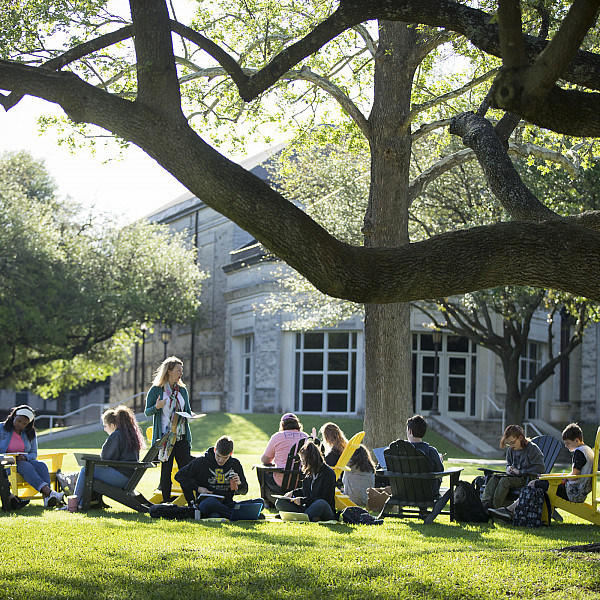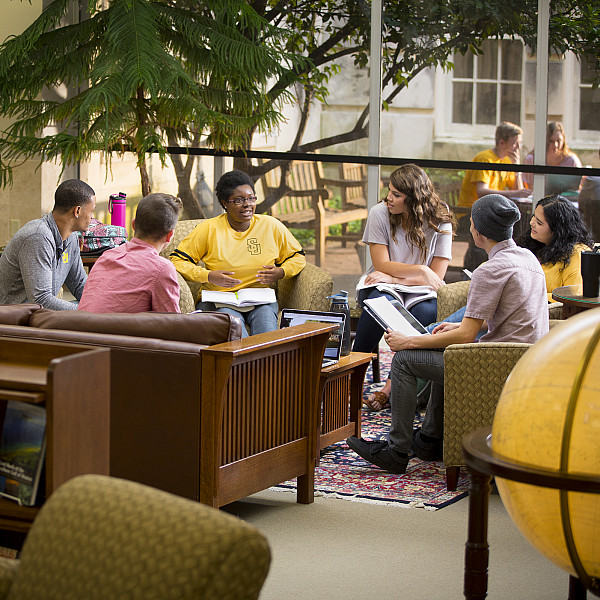News
Can I Get the “College Experience” at a Small University?
April 11, 2019
April 11, 2019
Open gallery

When it comes time to choose a college or university, it typically comes down to a well-known state school or a smaller private university. Both are great options; however, students need to make sure they find their fit because the college experience will differ depending on where you choose to attend. Whether you select a state school with 40,000+ students or a small private school with only 1,500 students, rest assured that you can enjoy the college experience no matter your choice. Here are a few key characteristics of the college experience at a small school to keep in mind.
What is the college experience?
How do you define the college experience? Is it living in a dorm? Is it attending a football game with 100,000 other screaming fans? Every person’s definition will differ, but there are a few aspects that remain the same: it’s a transition period to learn more about yourself, it’s figuring out what you want to achieve professionally, and it’s about taking advantage and making the most of this point in your life. However, no matter where you choose to go, it’s about having fun, making lifelong memories, and setting a foundation for your personal and professional growth.
When students are considering a small school, one of their main concerns is that they are going to miss out on opportunities provided by a larger university. However, according to Christine Bowman, the dean of admission and enrollment services at Southwestern University, this is a misunderstanding. Bowman says, “Students assume that a small school is going to have fewer opportunities when really the fact of the matter is a smaller school just provides different opportunities … . We have over a hundred student organizations; we have leadership opportunities; we have research opportunities.” Because of a small school’s nature, students are able to engage in a variety of activities, clubs, and roles—which is something students may not be able to do at a larger university because of competitiveness and the dedication each one usually requires.
Another big concern for students is the lack of facilities at a small university, such as having only a few dining options to choose from or a gym without many amenities. To an extent, this is true: some small universities simply do not have the funds or resources to provide state-of-the-art facilities. Nonetheless, this should not take away from your overall college experience; instead, a small school’s facilities create a sense of community. For instance, when you walk into the gym, you are likely to know at least a few people playing pick-up basketball—which makes it easier to jump in and start playing.
Students also may be concerned about a lack of dining options, but, as Bowman puts it, “There’s a part of me that remains a purist and really likes that we all eat in one dining hall together … . It doesn’t provide as great of a variety as you might have when there are 14 different dining facilities on campus, but it’s us, and it’s our family eating together as a community.”
Elizabeth Farwell ’19, a Southwestern student who transferred from a large university in Colorado, says, “At Southwestern, you see the same faces, get to know your neighbors, [and] get to know your faculty, which makes you feel more included and gives you a sense of place and belonging.” When you attend a small school, you are going to sacrifice a few of the amenities that you might receive at a larger school, but you will receive a communal feel that sticks with you long after college.
When you attend a small school, you are going to sacrifice a few of the amenities that you might receive at a larger school, but you will receive a communal feel that sticks with you long after college.
Intimate and engaging classes
When you think about the college experience, classes likely are not the first thing to come to mind. However, it is ultimately the reason you are in college; it is why you are making this substantial investment towards your future. Therefore, it is important to consider what experience you want to receive in the classroom. Would you feel more comfortable going unnoticed in a large lecture hall? Or do you want the professor to know your name and encourage you to interact and ask questions along the way? Farwell says, “A small school provides a more welcoming atmosphere because you don’t have 400 other students in the classroom; instead, everyone is allowed to engage and contribute during class.” Ultimately, both options will allow you to obtain your degree and be prepared for life after school—but how you get there will be significantly different.
The ability to build relationships with your professors
Similarly, because of the differences in classroom dynamics, professors get to know their students on a one-on-one basis at a smaller university. So students are able to catch up with the professor before and after class and seek clarification on any questions or concerns they have on the material in a professor’s office hours. Also, since professors teach multiple different classes in their discipline, it is likely you will take classes with the same professor multiple times. This allows you to get to know their teaching style and how their class is structured.
At a small university, you won’t be just a face in the crowd; professors want to get to know you. It’s not uncommon for a professor to invite their classes over to their house, engage in conversations with students over lunch in the dining hall, Skype with students over the weekend with any questions they may have, or even recommend students for internships or research opportunities. Through all of this, students create a lasting bond with their professors that extends well beyond their four years.
It’s not uncommon for a professor to invite their classes over to their house, engage in conversations with students over lunch in the dining hall, Skype with students over the weekend with any questions they may have, or even recommend students for internships or research opportunities.
Collaboration and communication
Whether you like group projects or not, they are an essential part of almost every profession. The ability to collaborate and effectively communicate is a crucial skill to learn. At a small school, you will be assigned group projects in almost every discipline—whether it’s biology or a Spanish class—that will require you to effectively communicate with your peers. Working in groups is not always fun, but it is a great way to get to know people in your major and even well beyond it. Fundamentally, working collaboratively teaches valuable teamwork skills and gives you tangible examples that you can give future employers after graduation.
Athletic events
Small schools’ athletic programs are typically classified as Division III, which means students do not receive scholarships, so athletes are simply playing because they love their sport. Your experiences attending a Division I sporting event and a Division III sporting event will be significantly different. At a Division III sporting event, you will not experience the massive tailgates, talented marching bands, or watching some of the most talented athletes in the country compete. That, however, does not take away from the amount of hard work and dedication you will see Division III athletes putting into their respective sports. In fact, it might even be more worthwhile attending a Division III sporting event because you are likely to know the athletes personally: one may be your roommate or be a member of the same student organization as you. Bowman says, ”You see them [student-athletes] eating in the dining hall with you and in the classroom, which again comes back to that sense of community.”
Student organizations
One aspect of small schools that usually turns students away is a lack of student organizations to join. However, this is a myth; Southwestern University, for example, has more than 100 student organizations ranging from fraternities and sororities to religious organizations and media groups.
Also, since small schools have fewer students, students are actually encouraged to participate in more than one organization. In her three years at Southwestern University, Farwell has been involved in four student organizations: Zeta Tau Alpha, the Student Government Association, SU Radio, and SU Sustain. Through her participation in multiple student organizations, Farwell says, “Being at a small school has allowed me to invest my time in different things I am interested in, which has allowed me to get to know other students, professors, and even the area more.” The ability to be involved in a number of different organizations encourages students to make a greater number of connections—plus, it looks great on a résumé!
You will get the college experience at a small university
In short, the answer is yes, you will get the college experience at a small university. Your experience is just going to be different from that at a large university, yet that is not necessarily a bad thing. A small university is not for everyone, but if you are looking for a more engaging and relationship-based experience, then it might be for you.
















